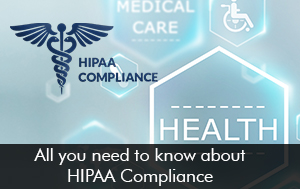Health Insurance Portability & Accountability Act (HIPAA) was passed by Congress in 1996. The purpose of this act was to secure personal health information of the patients. At that point in time, the medical records and prescriptions were either printed or they were written on a piece of paper and then kept in the filing cabinets.
Switching to Electronic Health Records (EHR) software from paper data has not changed the HIPAA regulations and security obligations of healthcare practitioners. This means that all the top EMR software vendors must keep patients’ health information and data secure in accordance with the Health Insurance Portability & Accountability Act.
This article will tell you about different uses of HIPAA compliance, and tell you why and how to make your Electronic Medical Records (EMR) software systems HIPAA compliant.
More about HIPAA
The standards set by HIPAA must be met to secure PHI (Protected Health Information), regardless of the information s electronic, oral or on paper. Health Insurance Portability & Accountability Act (HIPAA) applies to Covered Entities (CE) that offer treatment, operations, and payment. This also applies to physicians, clinics, chiropractors, dentists, psychologists, nursing homes, pharmacies, health insurance companies, clearinghouses, HMOs and employer-sponsored health plans.
HIPAA compliance also applies to Business Associates (BA) who can access patient data and provide support accordingly. Consultants, attorneys, CPA firms, pharmacy benefits managers, third-party administrators, and all medical transcriptionists fall under HIPAA.
There are severe penalties for HIPAA violations. Before 2009, one violation could result in a fine of up to $100. But after the Clinical Health Act (HITECH) got approved, the fine amount jumped to $50,000.
Security risks and how to prevent them
There is no doubt that Electronic Medical Records (EMR) software improve the standard of patient healthcare but there are certain security risks. These days hacking is very common. Hacking EMR software can destroy the system, change patient data, make private information public, and steal patient’s identity.
These security risks can be prevented by making your Electronic Health Records (EHR) software and Practice Management (PM) system HIPAA compliant. Following steps can make your information secure:
- Use of passwords and PINs to control and limit access to health data
- Encrypting data to make the information unreadable by unauthorized individuals
- Keeping a high functioning anti-virus software
- Recording who accesses data information and who makes any alterations
Top HIPAA Compliant EMR Software by EMRSystems:
EMRSystems values its customers and has compiled a list of the 5 best and top-rated HIPAA Compliance EHR & EMR software solutions in 2019. The list is solely based on customer reviews and ratings and is as follows:
|
Products |
HIPAA Compliance |
| Athenahealth EMR Software | Yes |
| AdvancedMD EMR Software | Yes |
| drchrono EMR Software | Yes |
| eClinicalWorks EMR Software | Yes |
| ChiroTouch EMR Software | Yes |







